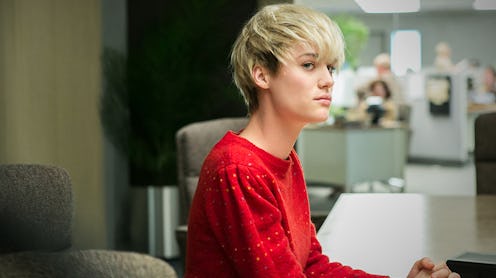Entertainment
'Halt and Catch Fire' Gave Us a History Lesson

On Sunday night, Halt and Catch Fire returned with its fifth episode of the season, "Adventure." At times, the episode, which introduced viewers to Joe MacMillan's father, made it seem like we might actually learn something new about Joe. You know, something that might actually help illuminate his still incredibly shadowy past. No dice. Unfortunately, it was all a tease and Joe is still as big of a mystery as ever. However, "Adventure" did get one thing right: it introduced viewers to Ada Lovelace.
At the beginning of the episode, Cameron Howe overhears the engineers discussing what to name Cardiff Electric's new PC. Some of their lame suggestions include "Alamo," "Death Star," "George," and "Khan." Yawn. Cameron bursts into the room and says, "Excuse me, I wrote the BIOS. I name it." She suggests, "Lovelace." The engineers chuckle, thinking that she's referencing porn star Linda Lovelace — but she's not. She's paying homage to Ada Lovelace, who is, as Cameron points out, "The first computer programmer ever."
Wait, who?
FindingAda.com tells us that "Ada Lovelace was born Ada Gordon in 1815" to English poet Lord Byron and his wife Annabella Milbanke. Naturally, the world's first computer programmer was raised "under a strict regimen of science, logic, and mathematics." So, why is she called "Ada Lovelace" if that wasn't really her name? At age 19, Ada married aristocrat William King, who later became the Earl of Lovelace, making Ada the Countess of Lovelace. That's how the name Ada Lovelace came to be.
FindingAda.com goes on to explain that Lovelace met Charles Babbage, a well-known math professor at the University of Cambridge in England, in 1833. She was "deeply intrigued" by Babbage's plans to build the Analytical Engine — a complex calculating machine. In 1842, Italian mathematician Luigi Menabrae asked Lovelace to translate and expand upon a piece he had written about the Analytical Engine because she was so familiar with Babbage's plans. The resulting article, which explains how the Analytical Engine would work, contains "several early 'computer programs'."
So, what does that mean, exactly? Suw Charman-Anderson, the founder of Ada Lovelace Day, broke it down for us in a 2013 Metro interview:
She wrote what is essentially a computer program. She wrote a description of how the machine could be programmed using punched cards to calculate Bernoulli numbers, a complex series of numbers. ...She understood that the Analytical Engine could actually be used given the right algorithms to create music or to create art. That was a massive leap because, at the time, Babbage was mainly thinking about big tables of numbers.
Tragically, Lovelace died of cancer at age 36, but her contributions to the world of technology live on. She even has her own holiday! Ada Lovelace Day, started in 2009 by Charman-Anderson, celebrates Lovelace's memory by asking people to blog about a woman that they admire in the fields of science, technology, engineering, or math. This year, Ada Lovelace Day falls on October 14.
Wow. One things for sure: Lovelace is definitely a better name for Cardiff's PC than Khan! Unfortunately, "Adventure" wasn't exactly what I would call riveting television (though it's probably the show's strongest offering since the pilot), but it gets a pass from me for probably introducing thousands of viewers to a fascinating historical figure who certainly doesn't get her due. Will you be celebrating Ada Lovelace Day this year?
Image: AMC